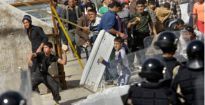Six Dead in Iraqi 'Day of Rage'
Thousands marched on government buildings and clashed with security forces in cities across Iraq on Friday, in the largest and most violent anti-government protests here since political unrest began spreading in the Arab world several weeks ago.
In two northern Iraqi cities, security forces trying to push back crowds opened fire, killing six demonstrators. In the capital of Baghdad, demonstrators knocked down blast walls, threw rocks and scuffled with club-wielding troops.
The protests, billed as a "Day of Rage, were fueled by anger over corruption, chronic unemployment and shoddy public services.
"We want a good life like human beings, not like animals," said Khalil Ibrahim, 44, one of about 3,000 protesters in the capital Baghdad.
Like many Iraqis, he railed against a government that locks itself in the highly fortified Green Zone, home to the parliament and the U.S. Embassy, and is viewed by most of its citizens as more interested in personal gain than public service.
The center of Baghdad was virtually locked down Friday, with soldiers searching protesters entering Liberation Square and closing off the plaza and side streets with razor wire. The heavy security presence reflected the concern of Iraqi officials that demonstrations here could gain traction as they did in Egypt and Tunisia, then spiral out of control.
Iraqi army helicopters buzzed overhead, while Humvees and trucks took up posts throughout the square, where flag-waving demonstrators shouted "No to unemployment," and "No to the liar al-Maliki," referring to Iraqi Prime Minister Nouri al-Maliki.
Demonstrators trying to get across a bridge going from the square to the Green Zone clashed with security forces. The demonstrators knocked down some of the concrete blast walls that were put up Thursday night and threw rocks at troops who beat them back with batons. Six riot police and 12 demonstrators were wounded in the melee, said police and hospital officials.
The protests stretched from the northern city of Mosul to the southern city of Basra, reflecting the widespread anger many Iraqis feel at the government's seeming inability to improve their lives.
Click here to read more.


